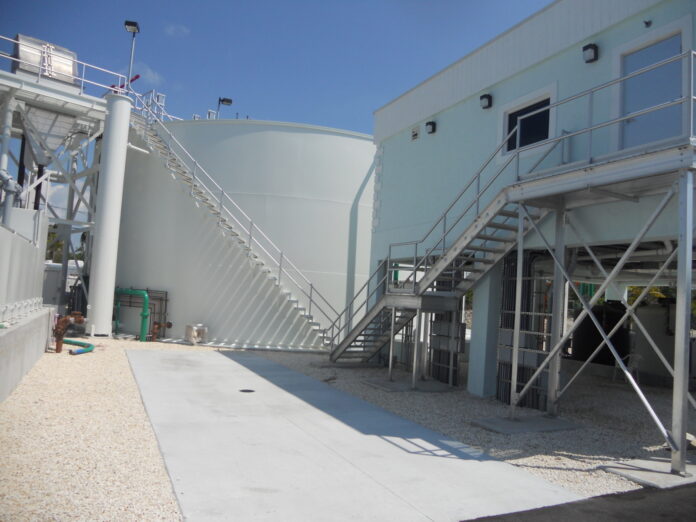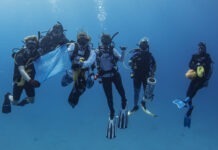
The Marathon City Council closed 2023 with one of its shortest agendas of the year on Dec. 12, but not without consequential decisions for the island.
Settling on a Deep Well
Tuesday evening opened with unanimous approval of a settlement agreement with Friends of the Lower Keys LLC (FOLKs), bringing the litigation filed against Marathon in January 2022 one step closer to resolution.
As part of the agreement, Marathon will install a single deep injection well for wastewater disposal at either its current wastewater treatment plant on Coco Plum’s Avenue I – already the site of a shallow well – or at a new site on Crawl Key by the end of 2028.
The decision comes after completion of a feasibility study of changes to Marathon’s wastewater program, which the city agreed to in return for a stay of litigation in the FOLKs case in February. As part of the study, the city considered deep well installation, potable water re-use, traditional re-use or a combination of the three.
Speaking to the Weekly after the meeting, City Manager George Garrett said the city will likely discontinue the use of its shallow injection well at the Area 3 plant next to Marathon Community Park and will eventually use an existing pipeline to deliver re-use water from its Area 4 treatment plant next to the Winn-Dixie plaza to the Florida Keys Country Club, Marathon High School and Sombrero Beach.
While FOLKs’ lawsuit alleges violations of the Clean Water Act and Endangered Species Act from all shallow injection wells used to dispose of Marathon’s effluent, the Community Park plant has come under the most intense scrutiny from environmental activists. In a recently-released review by Penn State University professors Lee Kump and Miquela Ingalls, EPA injection wells were used to conduct dye tracing experiments and track the migration of, and impact from, wastewater effluent into nearshore waters.
Though Marathon officials showed strong early opposition to FOLKs’ suit, Garrett said a 2020 Supreme Court case – in which pollutants from injection wells in Maui, Hawaii were shown to reach nearshore waters, thereby requiring a permit under the Clean Water Act as they were “the functional equivalent of direct discharge” – tipped the scales in favor of settlement.
“Our wastewater plants are absolutely conforming (with the law) … (but) when it got down to it with our attorney, it was his opinion that we had less than a 50% chance of winning this based on the law that was articulated in the Maui case,” Garrett said. “We decided, like it or not, this was the better alternative.
“I supported doing the monitoring that Lee Kump has done, and supported it being done at our Area 3 plant. The results became the results, regardless. Lee Kump is a very credible scientist.”
Garrett said that projected initial construction costs for the new injection well are estimated at $40 million, but it is still unclear whether the project would be eligible for grant funding.
“You’re required to meet a certain standard, but you don’t have to exceed that standard at (the state’s or the federal government’s) cost,” he said. “Ultimately, the state is going to say, ‘We’re protecting taxpayer dollars. You want a Taj Mahal instead of being able to just process sewage.’”
City to request building allocations in evacuation model change
With the Keys at a major turning point as the state considers modifications to hurricane evacuation models that could result in up to 7,950 additional building allocations throughout the island chain, Marathon is set to petition the state for additional units. This consideration, as explained by City Attorney Steve Williams, prioritizes protection for Marathon against liability in takings cases if owners of roughly 1,000 otherwise buildable lots sue the city, county and/or state when they are unable to obtain building rights.
“As your attorney, I don’t have an opinion on what they do with the entirety of Monroe County,” said Williams. “As to the city of Marathon … I think you, on record, need to ask for the units to protect ourselves. Takings cases are not imaginary … they are expensive, and in my experience going forward, you will lose every single one of them, because the rules are so written in favor of the property owners.
“I’m not advocating a particular number (of allocations) that you take … (but) get as much from (the state) as you can, so when the day ever comes that you don’t have a permit to give out, you can go on the record and say, ‘Dear state of Florida, please defend this, because we asked for all the units we could and you said no to us.’”
The council instructed Garrett and Williams to attend the Dec. 13 meeting of the Monroe County BOCC, which was set to include discussion of favorable evacuation models and a request for an unspecified number of additional units from the state, in order to voice the city’s concerns with takings cases and its desired direction moving forward.
Second vacation rental consolidation denied
Mirroring a similar decision from its September meeting, in which the council unanimously denied a conditional use permit to consolidate an Anglers Drive triplex into a single 11-bedroom vacation rental, it again denied consolidation of a duplex at 574 Sombrero Beach Road into another 11-bedroom rental in a split vote.
Recommended for approval by the city’s planning commission, the proposed conditional use would have permitted a maximum of six vehicles and one boat trailer parked at the residence. However, debate among the council centered around making an exception to Marathon’s code, which requires one parking space per bedroom for larger vacation rentals.
“We’re trying, on an 8,430-square-foot lot, to cram in 11 bedrooms and parking, and not have any under the structure,” said councilman Jeff Smith. “I’m not sure that I’m comfortable just simply saying, ‘Well, the solution is I’ll just require you to only have six cars.’”
“If you don’t do this, we actually have no conditions on us,” said builder Chad Neller. He argued that if the property remained split as two smaller units, the one-space-per-bedroom requirement would not apply and the property would only be required to maintain four parking spaces, with permission to park as many vehicles as possible within the boundaries of the property and driveway. “We’re imposing our own conditions here. … We’re asking you to take it from a duplex to a single family, which also means it can never be anything more than that – it can actually only get smaller.”
“We just turned down an 11-bedroom request with ample parking,” said councilman Kenny Matlock. “I feel we set a precedent at that point, and the other 11-bedroom could come back and say, ‘Well, you let them do it. Why can’t we do it?’”
“I think that we moved to approve a zoning in progress for a reason,” said Vice Mayor Lynn Landry. “I believe there are places where an 11- to 13-bedroom will fit in this community. I’m just not sure it’s this.”
The council voted 3-2 to deny the request, with Mayor Robyn Still and councilman Luis Gonzalez voting for approval.
Pumps to be added to Sombrero Boulevard storm drainage
With the approval of Resolution 2023-122, the city will move forward with adding active pumps to the existing stormwater injection wells on Sombrero Boulevard, a site of increasing concern with repeated road flooding during rain events and high tides. Though Matlock said he viewed the addition of pumps over raising the road as more of a “Band-Aid” fix, Garrett said the pumps mirror long-term fixes used in problematic areas of Key West.
Finance Director Jennifer Johnson said the pumps and road raising were both included in Marathon’s 2023-24 budget, with Landry adding that further measures to raise the road around the golf course were still on the table if the pumps were not effective.
In Other News:
- Garrett reported that although the barriers at the bottom of the homeless encampment on 20th Street have not yet been moved up the street, as requested by the council, the city has installed additional lighting on the street. He said the city plans to install two bulletproof security cameras and place a larger Dumpster from Marathon Garbage Service on the street.
- Grants Coordinator Maria Covelli reported that the city has submitted two grant applications to mitigate regular flooding on 92nd Street – one under FEMA’s Hazard Mitigation Grant Program, and another under the Resilient Florida Program.
- Unanimously approved at its first hearing, Ordinance 2023-23 will allow Sheriff’s Office deputies to issue a trespass warning for first-time violators of the city’s prohibition on consumption of alcoholic beverages and smoking at Marathon’s parks and beaches.
- Courtesy of a grant agreement with the State of Florida Department of Environmental Protection, Marathon’s Community Park basketball courts will be resurfaced and restriped with new fencing. The grant, which also includes striping for pickleball courts within the basketball courts, will pay $92,212 of the projected $122,950 cost.
























